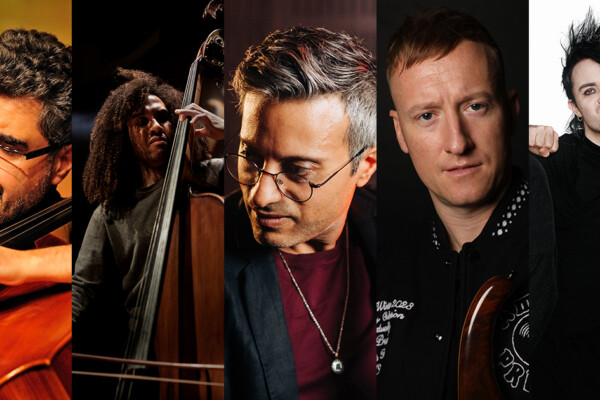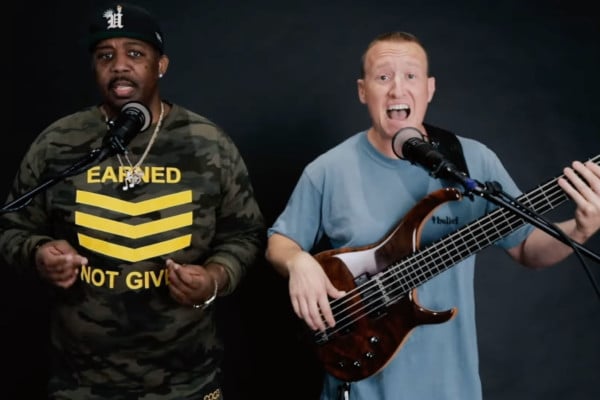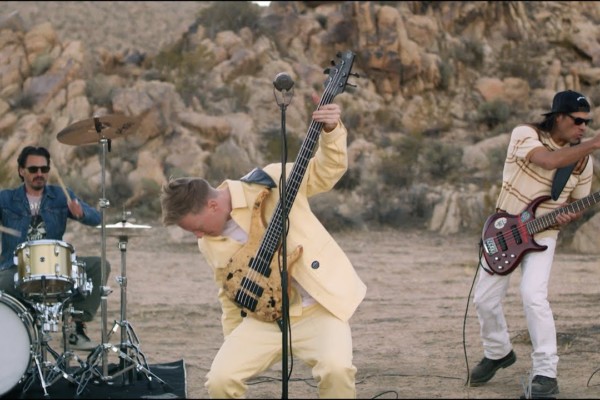Bass & Bars: An Interview with Brady Watt
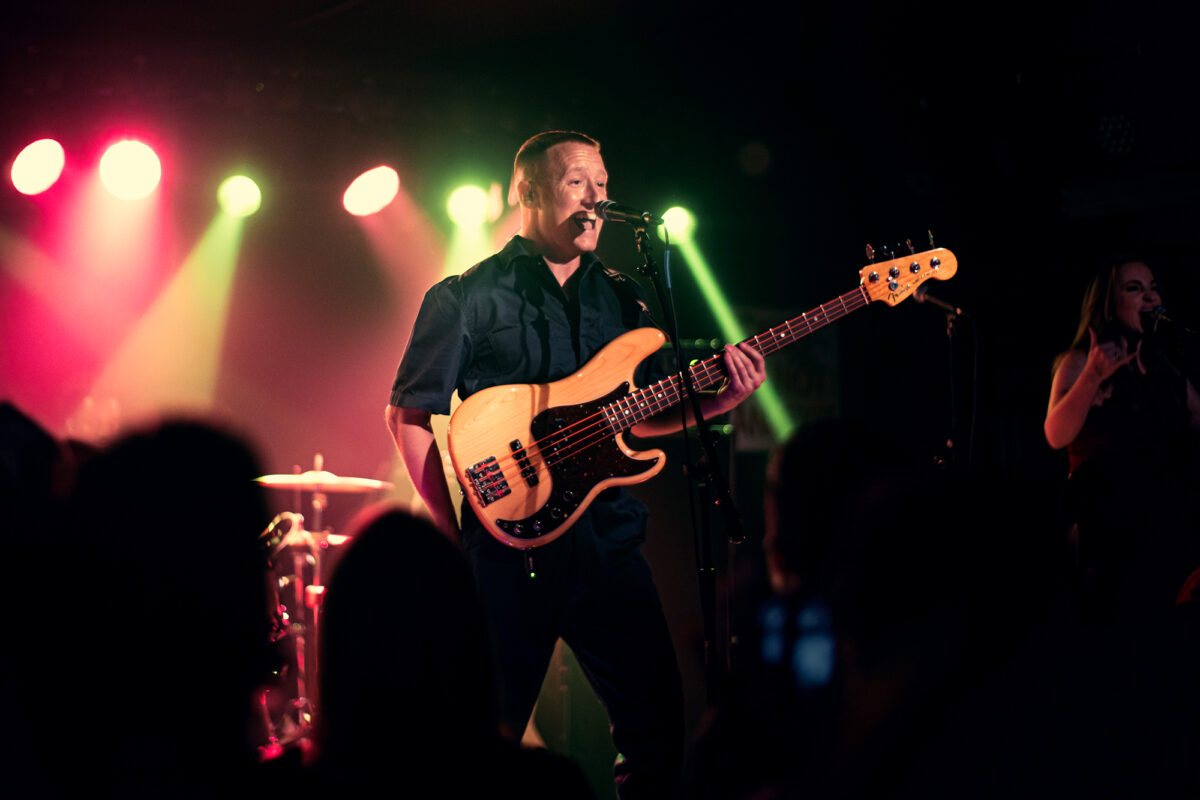
Brady Watt has been blowing up the hip hop world by breaking it down. His popular YouTube series Bass & Bars features him laying down iconic bass lines in a duet with the artists that made them popular. That includes a highlight reel of the genre: Warren G, MC Eiht, Evidence, Xzibit, B-Real, Krayzie Bone, Onyx, Styles P, and many more.
Watt also creates his own music with singles like “The Narcissist,” “Bodysnatchers,” and “Murderhornets.” One song from this year saw him collaborating with rock musicians instead of hip hop artists. “Nobody Home” is a monstrous song put together by Watt with Rage Against the Machine drummer Brad Wilk and Metallica bassist Robert Trujillo. The song and ensuing video became one of the most watched on No Treble for the summer.
Watt has just dropped the 49th episode of Bass & Bars with Havoc of Mobb Deep. He’s also launched a new line of swag for the series.
We caught up with Watt to get a deep dive into the song with the full scoop on his background, the bass legend that gave him his first upright lesson, and his advice for bassists looking to be producers.
I want to dig into your story. What are your musical beginnings?
I’m transparent with the whole journey. Right now, I’m 36, and I’ve been playing bass for 22 years. I was pretty much a professional musician right out of the gate. At least I considered myself one because I was in punk bands, but we were playing shows. We were active in the community opening for other punk bands and ska bands in Boston and New England before I could drive. I’d be at the computer booking shows at the computer and shouting, “Hey, mom, can you drive us to Framingham in two weeks? We got asked to open for Big Dee and the Kids Table!”
I’ve just been on this journey forever, and it’s evolved a lot over the years.
What kind of music was playing in your household growing up?
My parents listened to a lot of good music. My mom always had on R&B and hip-hop, stuff from the ‘70s and ‘80s – Chaka Khan or James Taylor. It was a great era for music. My dad loved Steely Dan, Tower of Power, and Jackson Browne. I call it “Dad Music,” which is still some of my favorite stuff.
The music was around, but none of my family were musicians. They were hard-working people. My dad owned a landscaping business. My parents weren’t together, but we only lived 15 minutes away. I had a real blue-collar upbringing in New Hampshire.
When did you pick up the bass, and did you play upright or electric first?
I played electric guitar first. When I was 13, my dad bought me one for Christmas, really randomly. I just started playing every day. One year later, my band needed a bass player, and I asked for one for Christmas. This was back in the day when the whole kit was $300 for the Ibanez bass and amp and everything. He was super supportive. My parents were always supportive. They never pushed me to do it. They were happy to be involved. To this day, I’m blessed with great parents.
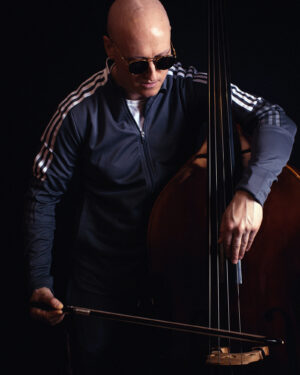 I just started playing upright two or three years ago after I went to go do a video with Stanley Clarke. He was interviewing me for his bass player series. I drove up to Topanga Canyon, where he’s got the Corvette parked by the crib. His crib looks like the song “Spain,” you know? [laughs] I pulled up, which was a huge honor. Of course, I practiced my ass off every day leading up to that. He’s a phenomenal upright player, and during the interview, I said, “I’ve never even taken an upright lesson. I’d love to have a lesson with you one day.” He said, “Let’s do it right now.” So my first upright bass lesson was with Stanley Clarke in front of a whole camera crew. It exists in the film.
I just started playing upright two or three years ago after I went to go do a video with Stanley Clarke. He was interviewing me for his bass player series. I drove up to Topanga Canyon, where he’s got the Corvette parked by the crib. His crib looks like the song “Spain,” you know? [laughs] I pulled up, which was a huge honor. Of course, I practiced my ass off every day leading up to that. He’s a phenomenal upright player, and during the interview, I said, “I’ve never even taken an upright lesson. I’d love to have a lesson with you one day.” He said, “Let’s do it right now.” So my first upright bass lesson was with Stanley Clarke in front of a whole camera crew. It exists in the film.
I think it’s going to come out as an episode. That was the day I started playing upright bass. It was that day that I vowed to get one and start playing because I played that one low E string with the bow and said, “Oh, this is phenomenal.” I flew to New York three days later and posted an APB to Instagram like, “Does anyone here have an upright I can shed on?” One of my buddies said he had one, so I borrowed it. Then COVID hit, so I just had an upright bass and a ton of time. I practiced pretty hard for a year. I’m still not very good compared to other guys, but I can get by on it.
That’s a pretty amazing way to start. You get a lesson with Stanley Clarke then you’re stuck at home with it.
I had no excuse. I had all the time, so it was perfect. It’s an everyday journey with that thing. The upright bass is just so much harder than the electric bass. It’s just what it is. I do most of my practicing on that because it’s like running with a weighted vest on.
Right now, it seems your main jam is hip hop bass lines. When did that come in for you?
I was eight years old when I started listening to hip hop. My older stepbrother was putting me on to new music. He put me onto A Tribe Called Quest, Wu-Tang Clan, all the best stuff on CDs. I’m steeped in this culture because we were listening to those CDs nonstop. I’ve been a hip hop-head for 28 years. Luckily, it was a nice era for it. I’ve seen it evolve a lot. There’s so much great stuff coming out now, it just takes some digging in.
It took some time for me to connect the bass with hip hop, though. I was doing that when I was 16.
Do you remember the first hip hop bass line that blew your mind?
I don’t know if there was one in particular. There are some that stand out, but maybe not one in particular. Maybe “Pete’s Jazz” by Pete Rock. That’s one I learned early on. I just started learning all of them after a while. It’s a repertoire in itself. And they’re pretty easy. They’re not that hard to play. Hip hop is really good for beginners, actually.
That’s a good point. It’s a memorable hook that people can sit in and feel the groove.
Yeah, and just repeat it over and over again. That’s how you get good at music. It’ll help your time. Of course, there are levels of mastery to the groove of it.
What does your career path look like after attending Berklee?
I was living on my own and had no fallback, so I was taking every gig I could. I was trying to get immersed in the scenes here, but I was just gigging. Hitting Craigslist ads, playing nonstop every day. African restaurants, playing at jazz bars for $40 and chicken at the end of the night for a long time. It was a crazy road I was on, just piecing together all those gigs.
Do you feel like there was a turning point that got you here, or was it just a slow build?
Every once in a while, your life changes overnight, but generally speaking, it’s been a long process of getting slowly better. That’s cool because I’ve seen all these cats blow up and then lose it all. I’ve just been brick by brick, stacking it.
Some nights there were certain parties I went to, and the next thing you know, I’m playing bass for these huge rappers. One night I met Ski Beatz and Dame Dash, and all of them. That changed my life. After that, I did so many big records, and everyone wanted to work with me. Also, when I started Bass & Bars, that changed everything. I was very well-known within the industry and well-accomplished. I was 33 years old but still hadn’t really broken out. I wasn’t really concerned with being in the forefront until much later. I just wanted to be the bass player up until my late 20s, then I realized I had more value to offer as an artist, producer, and composer.
Once I started Bass & Bars, everyone started returning my calls. It just works. Then everyone wanted to get on my beats and wanted to work. Sometimes you’ve got to do something like that to flip it on. I’ve gotten a lot better at playing bass from doing that series and from making videos in general.
I want to tell everyone to go ahead and make videos and release them. A lot of being an artist has to do with self-judgment and then your perception of others’ judgment of you. When you do the video, you get over that. One by one, you get better at putting stuff out and standing on your artistic output. You can follow all my videos back to when I was editing them myself and see the slow progression. You don’t start out with Bass & Bars. There’s a whole life lived up until that.
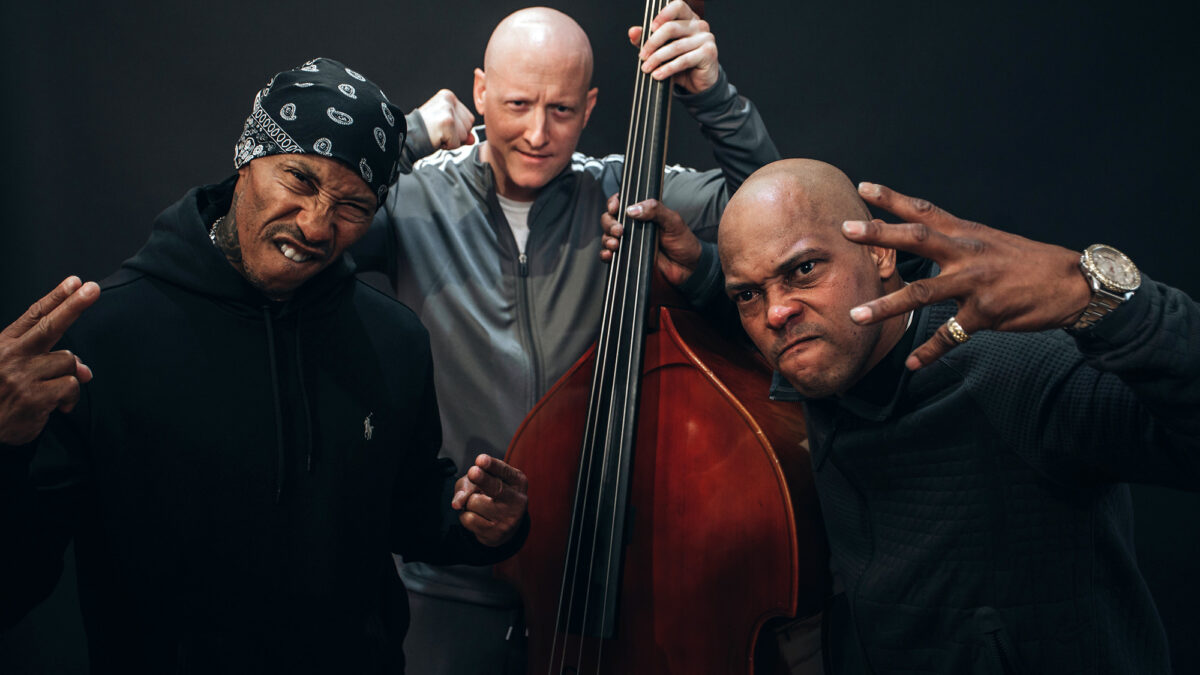
What is the scene like for a live musician playing hip hop?
Well, what’s cool about hip hop is it is sample-based, so it’s actually a combination of any and all genres. You might have to do anything. It could sample fusion or ancient Japanese music or Gregorian chants, or rock. You have to be able to do anything, so that’s why you see the jazz guys having their feet in both things. It is modern jazz, really.
As a bass player, the best thing to do to get into the scene, if there is one, is to team up with a producer and make as many records as possible. That’s how I got in, working with Ski Beatz. Then I became the producer eventually. I was sitting there writing the music and getting the musicians in there and editing. I thought, “Ok, I can do that.” I was looking over and learning all that for some years, then I just started doing it.
What kind of tips do you have for bass players that want to be a producer?
Get Ableton and start recording. Even if it’s all just bass lines, throw on the metronome and start recording stuff. That’s how I do everything. Now when I go in, it’s me and Carlos, the keyboard player I work with a lot. We go in and jam to clicks at different tempos, then go to edit them afterward to turn them into songs. In a nutshell, it’s simple.
I got my first platinum record recently with Jack Harlow, and that’s just me and Carlos jamming on some random day. I don’t even remember when it was because we do it all the time. We edit it and then have fun making the loop sound cool. Sometimes I’ll add drums myself or send it out to someone to put drums on. I’ll send it to DJ Premier or JetsonMade. In that case, I sent it to Jack Harlow, then he worked on it with Jetson, who sped it up and put drums on it. Then they got Adam Levine from Maroon 5 on it.
That also was because Jack and I had a Bass & Bars scheduled, and he had to cancel the day of to do a music video that became his biggest song of all time. It was the turning point of his whole career, and it was double booked with a Bass & Bars. So another lesson to the kids out there: if something doesn’t go your way, don’t get mad. Keep the relationship open. After that, I kept sending him different tracks over the years. That one landed, and it could be paying some of my bills for the rest of my life, maybe. Since then, I’ve sent hundreds more.
The ownership of the intellectual property is great. We’re in a great time for this because you put out your own music, and income comes in residually for you, potentially forever. Just start recording on your laptop. Buy a Scarlett 828. It was $100, and it’s fine. Plug it into your laptop, play bass to the click, and start building off of that. And jam with your friends.
When you’re jamming and just making things up, do you have certain artists in mind?
Yeah, and sometimes we’re just playing. One of us will start an idea and call out a tempo. I always have a mic going to run vocal ideas, too. Even with the Jack Harlow track, I would have never guessed that one to be the one, so what we do is make sure we finish all of them and get them into some sort of form to be an asset. It’s bounced down, it has the BPM in the title, it’s cataloged, and it takes shape from there.
If you’re producing that much, keeping track of it all must be half the battle.
Yeah. A lot of my job is texting dudes all day long. Seeing when vocals come in, checking emails, checking on artists. I have a manager and we have our own facility. DJ Premier has his own studio right next to mine, which is amazing. He has his whole thing going on and we bounce opportunities off of each other. Mainly me getting opportunities from him – he doesn’t need me for shit! [laughs] But I help him out with all types of stuff. He’s doing huge records. My manager will pop in and say, “Hey, this guy is looking for this; what do we have for him?” So we all work as a team. That’s fun.
It took a while to get the team. I was doing it by myself, with people getting on board one by one. I had to edit my own videos for so many years, and now I have a video guy on salary. That’s amazing. I never thought I’d have that, but the resources keep getting added as the story unfolds and when it makes sense. At some point, I’ve had to do all these little jobs myself.
How did you come up with the Bass & Bars series?
I had done Bass & Bars, but they weren’t called that yet. I had essentially done duets. One was with this Houston artist that’s my friend. He said, “Yo, I wanna do this video of just you on bass and me on vocals.” I said, “Okay, let’s do it.” I did the same thing again for one of my songs I released.
A lot of time went by, and at some point, I had some singles going. I was talking with my manager about making a series to promote. We needed a way for people to see what I was doing. I’m producing all these grand tracks and everything, and it’s like I had to break it all down to the smallest foundation for people to digest my music.
It seemed weird, even when my manager was pushing me to do it. I’m pretty open-minded. I said let’s try a couple out. I did one with Evidence and one with MC Eiht on the same day. Both of them, Preem [DJ Premier], called in. When Preem calls anyone to do anything, they have to do it. [laughs] So that was super clutch. They respect him to that level. I knew MC Eiht, but I didn’t know Evidence. They were both super cool and down to try it out with me. It went really good. The moment I posted the first one with Evidence, I checked back after a few minutes, and I had never gotten that many views on anything I had ever done. It was very obvious [we were onto something].
When you catch your stride in music or in video or whatever, you know it’s working. It was drastically different. It just went up from there. I dropped the MC Eiht one, and everyone went crazy; then we did episodes three, four, and five. I called in a few favors from people. I had been in Talib Kweli’s band since I was 22, so I called him up, and he was down.
I’ve never paid anyone for Bass & Bars, and I’ve never taken payment for an artist asking me to do it. I just use the barter system. They know I’ll do a favor for them. I’ve given them a beat or played bass on their album and all this other behind-the-scenes stuff. We’re always trading, especially in the rap world. There are not as many financial transactions between the artists a lot of the time. Unless the label is involved for big records, then we’re getting paid up front for those. But a lot of times, it’s an unwritten handoff. I think it’s a cool thing. It preserves relationships a lot of the time. Then people will say, “Hey, I need you to do this,” and you’ll say, “Hell yeah!” First, that sounds fun, then you did something for me.
Plus you keep the integrity. As soon as money gets into the art, it gets weird.
It does. A lot of the time, I’d rather trade for a beat or a feature. That usually gives them more value than if I was going to charge them some nominal fee. This way, they get a beat rather than a little check. It’s something to keep it moving.
You said earlier that Bass & Bars has made you a better bass player. How is that?
A lot of ways. Just being on the spot, playing with me having to control the tempo and the beat with no click while simultaneously keeping the rapper on time. That’s a whole balance up there. You don’t want to overplay very much because none of them have done this before. No one has. When was the last time they did a bass and vocals performance? Pretty rare. Of course, they’ve worked with bass players before, but some of them never have and definitely never just bass. It’s my job to keep them comfortable and keep the beat going and just move with it. That was developed over time. Playing with a metronome on for however many years. I focus a lot on my breath to say grounded. I take my time before we hit record. It’s just things I’ve learned up til now.
Who do you want to have on Bass & Bars that you haven’t yet?
There are so many. My goal for that is to do it forever because it’s a sustainable concept. I can do it til I drop. Right now, I’m doing all the rappers and a lot of the older ones now. I’ll get with the younger ones. The ultimate bosses of Bass and Bars is if I’m to get Wu-Tang Clan – the entire clan – to do “Triumph.” If I do that, that’ll be game over. It’ll be game over for hip hop for a while, then I’ll do Sting and Bruce Springsteen and all those great songwriters. It could be whatever, it’s just a duet. There are endless opportunities.
What’s cool is every time I do it, I become friends with that artist, so it just increases my network. More people see me every time I drop an episode. A new artist always comes to say, “Hey, let’s do one.” It all leads to another thing. It’s pretty dope.
Another collaboration I didn’t see coming was for “Coming Home”.
I didn’t see that coming either, and I still can’t believe it either. I’m gonna really break it down right now because I don’t think I have yet.
Once again, that goes to what I was saying earlier about cutting the audio up. I recorded that lead line to a click one day, and that was supposed to be a hip hop beat of some sort. Even Papoose rapped on that at some point, but we didn’t finish it or something. Through Bass & Bars, Brad Wilk had reached out to me very early on, probably in episode four or five. We became friends, and I went out to his house, which was a huge honor. At this point, I’m like, “Whoa, this is crazy,” because all of my heroes were reaching out to me because of the series.
We jammed out a bunch. I sent him the idea for him to put drums on. I took it piece by piece, thinking first I’d get the drums on it, then take it to another artist after that. I got the drums and made a cool arrangement. Then I hit up a bunch of people to get on it. Brad just mentioned me to Robert; they had met or something like that. He said it would be cool if he got on it, and Robert agreed. It was COVID, man. People had time. If you were able to send out records to work remotely. Everyone’s got their little home studio. Trujillo just laced it up with playing and soloing. We talked on the phone a bunch. There was a whole back and forth. He’d call me and just talk for 45 minutes, and I’d just be listening. When you’ve got these legends, just listen. You don’t do the talking, bro. [laughs] Same with Brad Wilk. I’m all ears.
So he laced it up, and I just edited it. I made a form. The next piece I did was the melody line. It’s like a G minor pentatonic type of line. I played it on bass, and it was really dope. I was digging it. Those lyrics just came to me. At this point, I had sung a few hooks recently and was kind of feeling myself. I never intended on being a singer, but I had this Neumann [microphone] next to my head. I’m in the studio, and I’ve got the stuff now, so I figured I’d give it a whack.
Over the years, girlfriends and others have said I had a good voice. My mother always told me my vocabulary would be good for writing lyrics. I never did words, but it was a self-permission thing. I was just a composer. During COVID, I got the bug to put some words down. Those words fit right in with the phrase I was doing. It started as a bass line, then the words fit: “I’ve been fighting with the devil inside of me; every time I check upstairs, there’s nobody home.” I tracked it and let two or three days go by, thinking, “Should I send it to him?” I played it for Preemo, and he said it was dope. They said to send it to them, but it was new waters for me. I sent it to both of them they loved it. I had no pushback at all. I expected some pushback, but both of these rock legends were like, “Yeah, you’re a great singer.” That was a huge confidence boost. You know, when you’re starting something new, you can get in your own head and quit easily if you don’t have that positive reinforcement. I had monstrous positive reinforcement when I started, and I just kept going from there.
Now it’s something every day. Now I’m a singer, but it’s been about two years since that. So that’s how all that came together. It was a huge growth opportunity for me.
Are you working on a lot of vocal tunes now?
Yeah. It’s really an evolution because all of these tunes are in the same vein as the instrumental stuff that I was doing. They’re all bass and crazy synths and hip hop drums. It’s right in line with what I’m doing, but now I’m doing vocals on them. My latest song is my version of “All Along the Watchtower”, singing it and playing bass.
I still have some dope instrumentals in the tuck. They’re still going to be coming without me on vocals. But yeah, I’m singing on a bunch of stuff because it’s more accessible for people. I ain’t trying to be out there riffing like Aretha Franklin or anything. I don’t need to be the best virtuosic singer. I just like the power of the vocal and the lyrics. It’s a really great feeling.
And it’s another form of self-expression.
Yeah, another avenue. And it doubles your publishing out the gate. If you’re just doing the music, you’re only getting half the pie. By deciding you’re writing lyrics now, your cut is doubled, theoretically. We all use our words every day, and we use our voice every day. It’s easier than you think. I think a lot of artists are tricky. They try to mystify all this stuff. I’m one of these dudes that’s like, “Naw, it’s not that hard.” [laughs] Just come up with the words.

